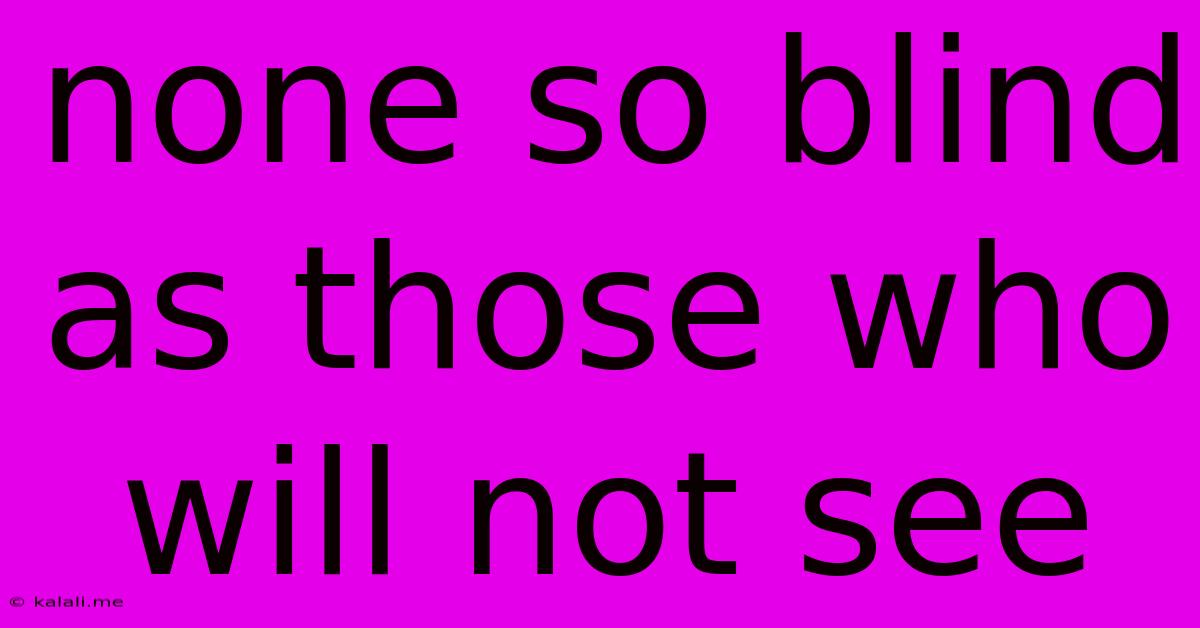None So Blind As Those Who Will Not See
Kalali
May 21, 2025 · 3 min read

Table of Contents
None So Blind As Those Who Will Not See: Understanding Willful Blindness
The proverb "none so blind as those who will not see" speaks volumes about the human condition. It highlights the self-imposed limitations we create when we refuse to acknowledge uncomfortable truths, even when the evidence is staring us in the face. This isn't simply about a lack of sight; it's about a deliberate avoidance of reality, a form of willful blindness. This article will explore the various facets of this phenomenon, examining its psychological roots, its societal implications, and how to overcome it.
What is Willful Blindness?
Willful blindness, also known as deliberate ignorance, is the act of consciously choosing to ignore readily available information that might cause emotional distress, challenge pre-existing beliefs, or require difficult action. It's a form of self-deception, a way of protecting oneself from confronting uncomfortable realities. Unlike simple ignorance, which is a lack of knowledge, willful blindness is a conscious decision to remain uninformed. This can manifest in numerous ways, from ignoring obvious signs of a partner's infidelity to dismissing scientific evidence of climate change.
The Psychology Behind Willful Blindness:
Several psychological mechanisms contribute to willful blindness. These include:
- Cognitive dissonance: This is the mental discomfort experienced when holding two conflicting beliefs. To reduce this discomfort, individuals may choose to ignore information that contradicts their existing beliefs.
- Confirmation bias: This is the tendency to search for, interpret, favor, and recall information that confirms or supports one's prior beliefs or values. This leads to selectively focusing on information that supports one's view and ignoring contradictory evidence.
- Emotional regulation: Facing uncomfortable truths can be emotionally overwhelming. Willful blindness serves as a defense mechanism, protecting individuals from the anxiety and distress associated with acknowledging difficult realities.
- Motivated reasoning: This involves using reasoning to reach a conclusion that one already wants to believe. It's a form of self-justification that allows individuals to maintain their preferred beliefs, even in the face of contradictory evidence.
Societal Implications of Willful Blindness:
The consequences of willful blindness extend far beyond individual lives. On a societal level, it can lead to:
- Delayed action on critical issues: Ignoring scientific consensus on climate change, for example, can lead to delayed action with devastating consequences.
- Erosion of trust: When individuals or institutions engage in willful blindness, it erodes public trust and fuels cynicism.
- Perpetuation of injustice: Ignoring systemic inequalities and biases can perpetuate harmful systems of oppression.
- Spread of misinformation: Willful blindness creates fertile ground for the spread of misinformation and conspiracy theories.
Overcoming Willful Blindness:
While overcoming willful blindness can be challenging, it's crucial for personal growth and societal progress. Here are some strategies:
- Cultivate intellectual humility: Recognize the limitations of one's own knowledge and be open to changing one's mind.
- Seek diverse perspectives: Actively seek out information from different sources and perspectives.
- Practice critical thinking: Develop the ability to evaluate information objectively and identify biases.
- Embrace discomfort: Acknowledge that facing uncomfortable truths is part of personal growth and societal progress.
- Engage in self-reflection: Regularly examine one's own beliefs and assumptions.
In conclusion, "none so blind as those who will not see" is a powerful reminder of the dangers of willful blindness. By understanding the psychological mechanisms behind this phenomenon and actively working to overcome it, we can foster greater self-awareness, improve decision-making, and contribute to a more just and informed society. The path to truth requires courage, intellectual honesty, and a willingness to confront uncomfortable realities. Only then can we truly see.
Latest Posts
Latest Posts
-
Does Order By Cause An Index Scan
May 23, 2025
-
How Do You Play A Rendered Video
May 23, 2025
-
Bibliographystyle Url For Numerical Citation Style
May 23, 2025
-
What Does Libre In Floss Mean
May 23, 2025
-
Can You Use Ecterta In A Professional Paper
May 23, 2025
Related Post
Thank you for visiting our website which covers about None So Blind As Those Who Will Not See . We hope the information provided has been useful to you. Feel free to contact us if you have any questions or need further assistance. See you next time and don't miss to bookmark.